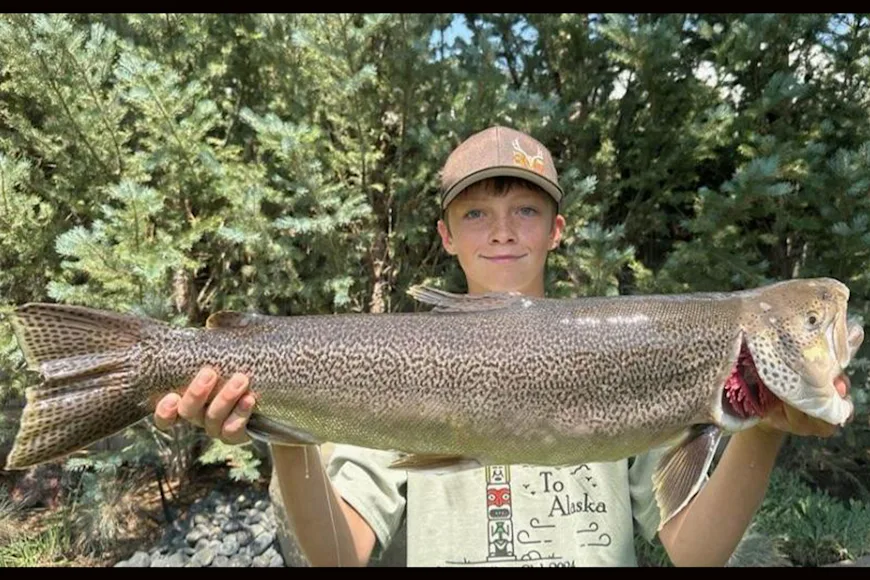The tiger trout that Wyoming Game and Fish Department (WGFD) stocks in Cowboy State lakes are often put there for management reasons—to help control populations of undesirable or overabundant fish species. But as 13-year-old Jaxon Krall learned this summer, these unique hybrids can also provide a thrilling, state-record angling experience.
The Kemmerer teenager was fishing “for anything that would bite” at Viva Naughton Reservoir in late July when he hooked a 12.77-pound tiger trout that beat the Wyoming state record for the species by nearly a pound. Krall’s whopper measured 31.25 inches long and had a girth of 16.75 inches, according to an online announcement posted by WGFD on Aug. 19.
Those numbers were plenty big enough to top the standing state record, an 11.93-pound fish caught at the same lake in 2023 by Owen Schaad. Before Schaad’s catch, the record had stood unbroken for 11 years.
“I was excited and nervous,” Krall said of the trip into Kemmerer to weigh the fish on a certified scale and find out if it might be a new record, “and I was really happy and excited when it was.”
Tiger trout are sterile hybrids produced by crossing a female brown trout with a male brook trout. Because they do not reproduce, tiger trout tend to put all their energy into growth. Biologists can introduce the aggressive feeders into bodies of water where undesirable species like suckers are overabundant, or where overpopulation has led to stunted growth in more desirable species. They have been stocked in Viva Naughton every year since 2014 to help curb numbers of Utah chub in the 4,000-acre lake, where rainbow trout are the primary fish species.
Wyoming started producing tiger trout eggs at its Story Hatchery in 2011. After mixing eggs from the female with milt from the male, biologists put the fertilized eggs in a small pressure chamber to produce a “triploid egg”—an egg that contains three rather than two sets of chromosomes. That extra copy of DNA is what makes reproduction impossible, and it’s the pressure treatment method, applied at just the right time during egg development, that prevents the egg from rejecting the third chromosome.
The process also greatly improves survivability of the eggs. “The quality of eggs produced by the Story Hatchery have become so highly regarded that they are shipped to the state of Nebraska, South Dakota, Colorado, Idaho, and Oregon as part of the Game and Fish’s hatchery trading program that brings walleye, catfish, and other species back to Wyoming,” according to a WGFD article on the process.
Krall caught his state-record fish using a Thomas Buoyant lure while fishing from shore—a good approach, according to Robb Keith, a fisheries supervisor with WGFD.
Read Next: Montana Angler Boats Massive, Record-Breaking Chinook Salmon
“We see them predominantly close to shore down to 25 feet of water,” says Keith, who notes that the aggressive predators’ access to ample food and the department’s plans for continued stocking should mean that the reservoir continues producing tigers that match or surpass the previous two record-setters. “They are found close to structures. They are eating shiners and Utah chubs, so anglers should choose lures, flies and baits that resemble these forage fish.”


